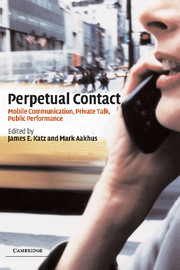Book contents
- Frontmatter
- Contents
- List of figures
- List of tables
- Notes on the contributors
- Preface and acknowledgments
- 1 Introduction: framing the issues
- PART I Mobile communication: national and comparative perspectives
- PART II Private talk: interpersonal relations and micro-behavior
- 10 Hyper-coordination via mobile phones in Norway
- 11 Mobile culture of children and teenagers in Finland
- 12 Pretense of intimacy in France
- 13 Mobile phone consumption and concepts of personhood
- PART III Public performance: social groups and structures
- Appendixes
- Index
- References
13 - Mobile phone consumption and concepts of personhood
Published online by Cambridge University Press: 22 September 2009
- Frontmatter
- Contents
- List of figures
- List of tables
- Notes on the contributors
- Preface and acknowledgments
- 1 Introduction: framing the issues
- PART I Mobile communication: national and comparative perspectives
- PART II Private talk: interpersonal relations and micro-behavior
- 10 Hyper-coordination via mobile phones in Norway
- 11 Mobile culture of children and teenagers in Finland
- 12 Pretense of intimacy in France
- 13 Mobile phone consumption and concepts of personhood
- PART III Public performance: social groups and structures
- Appendixes
- Index
- References
Summary
Contemplation of a mobile telephone, or, in general, technology, evokes ideas about change or the social consequences of change. The implicit understanding in societal and academic terms is that technological innovation engenders a number of social ramifications. This thesis is not necessarily deterministic, defined as the notion that the nature of an object necessitates a given set of social relations (Latour, 1993). Sociologists and anthropologists alike have devoted themselves to working past the problem of technological determinism (Ormond, 1995; Bloch and Parry, 1989) in arguing that mere materiality plays no role in social constructions. In exploring a middle ground, we ask how mobile phones can be rationalized in concepts of continuity and change. This chapter theorizes how society's concepts of old and new, on the one hand, and individuality and community-relatedness, on the other, are pertinent to everyday use of material objects. We argue that all four components of these dichotomies rely on people to create and negotiate meanings for themselves. Our central claim is that the mobile phone acts as a means of providing material characteristics for these often conflicting societal concepts.
We focus on the social construction of individuality through mobile phone consumption. In fact, it might be better said that the English strongly associate the mobile with the perpetual reinvention of the individual. The meaning of mobile phones can be correlated to Hirsch and Silverstone's (1992) conception of a “moral economy,” whereby members of a household compare and contrast themselves with one another as well as with other households, thereby developing identities and moralities by way of distanced relatedness.
- Type
- Chapter
- Information
- Perpetual ContactMobile Communication, Private Talk, Public Performance, pp. 206 - 222Publisher: Cambridge University PressPrint publication year: 2002
References
- 24
- Cited by



